Introduction: Why B2B Distributors Need a Smarter eSeller Strategy
Selling in today’s B2B world is not simple. Customer expectations are rising, buying cycles are shifting online, and distributors are under pressure to sell faster and with fewer errors. This is why becoming an effective B2B eSeller is no longer optional. It is the foundation of modern growth.
Distributors now need a digital system that supports the full B2B business portal experience—product catalogs, contract pricing, personalized workflows, and self-service ordering. The right platform helps teams simplify the B2B selling process, improve customer relationships, and compete with large online sellers.
This guide explains what B2B selling means, why it matters today, and how you can build a strong B2B eSeller strategy using modern ecommerce tools like the B2Sell eSeller platform—a flexible system that supports B2B, B2C, hybrid, and dropship portals.
What Is B2B Selling?
B2B selling means selling products or services from one business to another.
It includes:
- Bulk orders
- Contract pricing
- Credit limits
- Dealer-specific catalogs
- Repeat orders
A b2b seller uses digital tools to manage these processes smoothly.
A modern B2B business portal lets buyers place orders, check stock, and track shipments—all without calling a sales rep.
Why B2B Selling Is Different from B2C
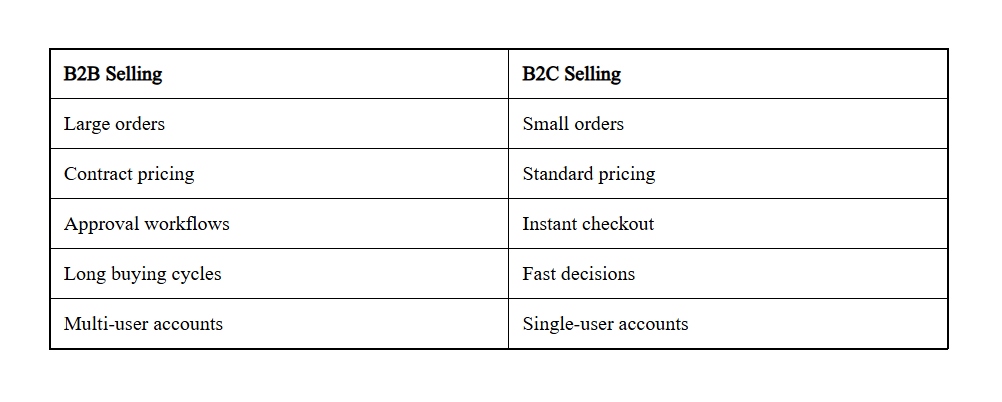
Because of these differences, distributors need a b2b selling platform designed for complexity—from quoting to fulfillment.
Why B2B eSeller Platforms Matter in 2026
A modern b2b seller needs more than a basic online storefront. Distributors need tools to manage buyers, pricing, workflows, inventory, and integrations with ERPs.
Platforms like B2Sell eSeller offer:
- Strong product catalog management
- Role-based buyer controls
- Contract and tier-based pricing
- Accurate inventory sync
- Real-time data connections with ERP and CRM
- Support for B2B, B2C, and hybrid selling
Digital transformation is no longer optional. Buyers judge suppliers based on digital experience. A slow or outdated portal pushes them toward competitors.
Explore how B2Sell supports full ecommerce management:
Visit: B2B & B2C Ecommerce → (https://www.b2sell.com/products-b2b-b2c-ecommerce)
Learn more about B2B ecommerce capabilities: → (https://www.b2sell.com/b2b-ecommerce)
Challenges Distributors Face in the Online Selling Process
1. Complex Product Catalogs
Distributors often manage thousands of SKUs, variations, and technical specifications. Listing these manually leads to errors, delays, and inconsistencies.
2. Difficulty Managing Buyer Groups
B2B buyers have different roles, budgets, approval workflows, and pricing. A basic e-commerce website cannot handle this complexity.
3. Outdated or Disconnected Systems
Many distributors use legacy ERPs without real-time ecommerce integration. This causes:
- Pricing mismatches
- Out-of-stock orders
- Slow fulfillment
- Manual re-entry errors
4. High Customer Support Workload
Without a self-service b2b business portal, customers call or email for:
- Past invoices
- Order status
- Inventory availability
- Reorders
This increases operational costs.
5. Slow B2B Selling Process
Manual quoting, approval steps, and spreadsheets slow down order cycles. This reduces productivity and impacts revenue.
6. Limited Online Experience
Many distributors still rely on outdated sites with no self-service features.
7. Hard to Scale
Manual workflows break when order volumes grow.
8. Competition From Online Marketplaces
B2B marketplaces in the USA (Amazon Business, Alibaba, Global Sources) are rising quickly.
To compete, distributors need a strong b2b eseller in USA-friendly platform with automation and personalization.
Choosing the Right Platform to Sell B2B Technology
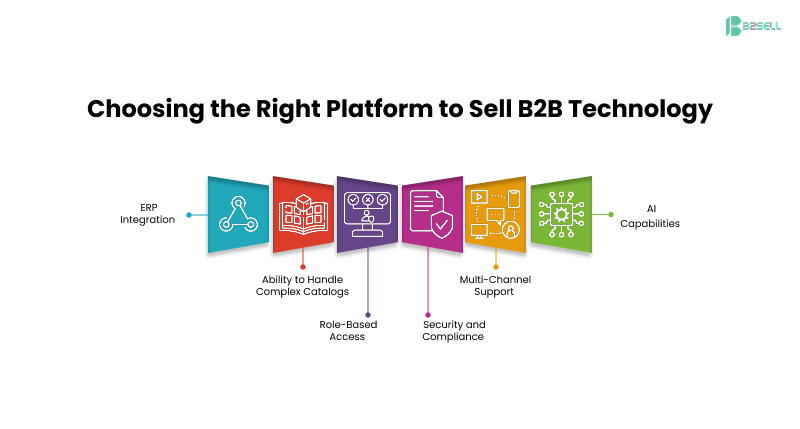
1. ERP Integration
Sync inventory, pricing, orders, and customers.
2. Ability to Handle Complex Catalogs
Tech products have attributes, variations, and spec sheets.
3. Role-Based Access
Sales reps, buyers, managers, and dealers need different views.
4. Security and Compliance
Especially important when selling B2B software or hardware.
5. Multi-Channel Support
Hybrid ecommerce is the future:
B2B + B2C + Marketplace + Dropship.
6. AI Capabilities
AI search, recommendations, and automation improve conversions.
This is why B2Sell eSeller becomes the preferred platform for distributors who sell technology or multi-category catalogs.
Comprehensive Features for Diverse E-Commerce Needs
B2Sell eSeller offers a wide feature set built for distributors expanding into B2B, B2C, B2B2C, and hybrid models. It also supports Shopify integration, allowing brands to merge front-end simplicity with enterprise-level B2B workflows.
Here are the core capabilities explained in detail:
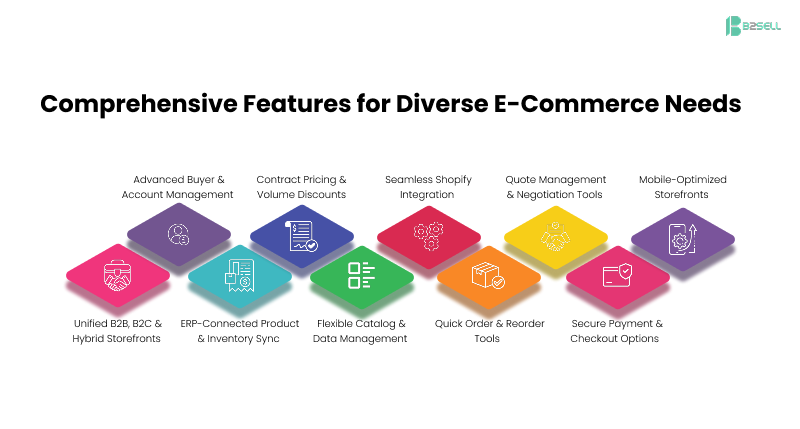
1. Unified B2B, B2C & Hybrid Storefronts
A single platform supports:
- Direct-to-customer (D2C) sales
- Distributor-to-retailer sales
- B2B to B2C hybrid operations
- Dropship fulfillment models
This flexibility helps businesses expand without switching platforms.
2. Advanced Buyer & Account Management
Create custom buyer groups with:
- Role-based permissions
- Spending limits
- Multi-user accounts
- Approval hierarchies
Perfect for distributors with complex corporate buyers.
3. ERP-Connected Product & Inventory Sync
Real-time integration ensures:
- Accurate inventory levels
- Correct contract pricing
- Updated product details
- Faster order fulfillment
Use B2Sell’s B2B Ecommerce integrations to learn more.
4. Contract Pricing & Volume Discounts
Supports:
- Tiered pricing
- Customer-specific pricing
- Bulk and volume discounts
- Contract-based rates
5. Flexible Catalog & Data Management
Manage large product databases with:
- Variants
- Technical specs
- Custom attributes
- Bulk import & export
6. Seamless Shopify Integration
Run a Shopify storefront while B2Sell handles:
- B2B rules
- Custom pricing
- Inventory logic
- ERP sync
- Buyer workflows
This creates a powerful hybrid of B2C design + B2B functionality.
7. Quick Order & Reorder Tools
Enable buyers to:
- Upload CSV order lists
- Use saved order templates
- Reorder past purchases in 1 click
8. Quote Management & Negotiation Tools
Streamline quote requests with:
- Custom quote forms
- Automated approval flows
- Seller-managed pricing adjustments
9. Secure Payment & Checkout Options
Support:
- Purchase orders
- Credit limits
- Net terms
- Multiple payment gateways
10. Mobile-Optimized Storefronts
Buyers can order from phones or tablets with ease.
How the B2B Selling Process Works with B2Sell
A typical flow:
- Buyer logs into the b2b seller portal
- Views custom catalog and pricing
- Checks real-time inventory
- Adds products to cart (or uploads bulk order list)
- Requests quote or checks out
- Order auto-syncs to ERP
- Buyer tracks shipment and reorders later
Everything runs smoothly because data stays updated in real time.
Realistic Examples & Use Cases
1. Industrial Distributor Selling B2B and B2C
A supplier selling tools to contractors and consumers uses B2Sell to:
- Offer retail pricing for B2C
- Provide bulk discounts for B2B contractors
- Sync inventory with ERP automatically
2. Electronics Distributor Using a Dropship Model
The business connects vendors to a central portal.
B2Sell manages:
- Vendor catalog uploads
- Automatic routing of dropship orders
- Multi-supplier pricing
3. Automotive Parts Distributor Needing Accurate Inventory
Real-time ERP sync helps them:
- Prevent overselling
- Manage core charges
- Support mobile ordering for field buyers
4. Software & Technology Resellers
Use B2Sell to manage:
- Subscription renewals
- License tiers
- Customer usage data
- Contract invoices
Top Benefits of Becoming a High-Performance B2B eSeller
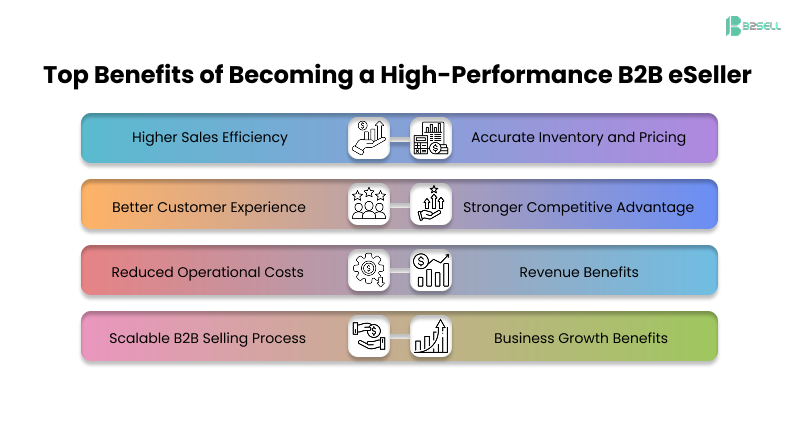
1. Higher Sales Efficiency
- 40–60% fewer manual tasks
- Faster order processing
- Streamlined quotes and approvals
2. Better Customer Experience
- 24/7 self-service portal
- Personalized pricing
- Fast reorder options
3. Reduced Operational Costs
- Less manual data entry
- Fewer inventory errors
- Lower support workload
4. Scalable B2B Selling Process
- Handle thousands of SKUs
- Support unlimited buyers
- Expand into new models without rebuilding
5. Accurate Inventory and Pricing
Real-time data helps avoid stockouts and customer complaints.
6. Stronger Competitive Advantage
You offer a better buying experience than traditional distributors.
7. Revenue Benefits
- 20–40% increase in repeat purchases
- more cross-sell opportunities
- higher conversion rates through improved search
- reduced cart abandonment
8. Business Growth Benefits
- scale to new regions easily
- onboard dealers faster
- support hybrid business models
- integrate with ERP, CRM, PIM, WMS
Conclusion: Your Path to Becoming a Stronger B2B eSeller
Modern distributors need reliable tools to manage online growth. A strong B2B eSeller platform helps you automate operations, support customers, and stay competitive. With B2Sell eSeller, businesses can move from manual processes to automated, scalable digital commerce.
B2Sell gives you the tools to support B2B, B2C, hybrid, dropship, and multi-channel selling—everything you need to build a stronger e-commerce future.
Ready to Transform Your B2B Selling Strategy?
Take the next step and see how B2Sell transforms your selling process.
👉 Request a Demo to see B2Sell in action
👉 Book a Strategy Call with our ecommerce experts
👉 Download the Ultimate B2B eSeller Checklist
Your transformation begins here.

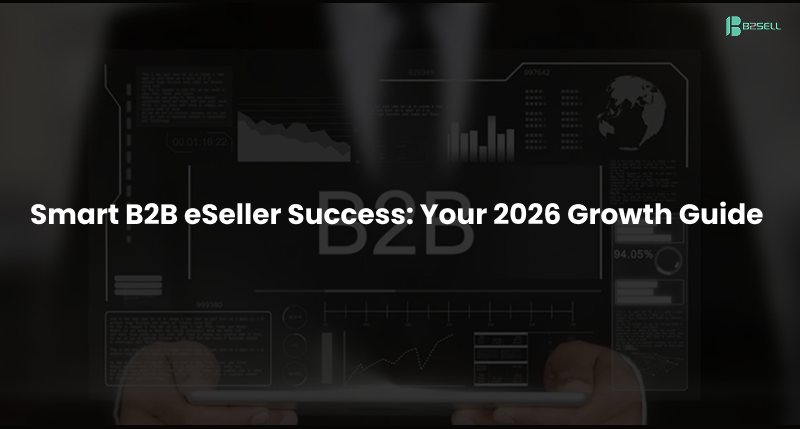

.png)
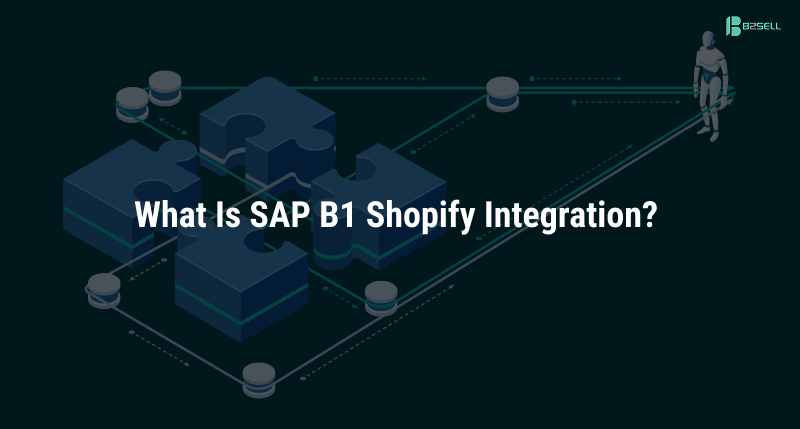


.png)